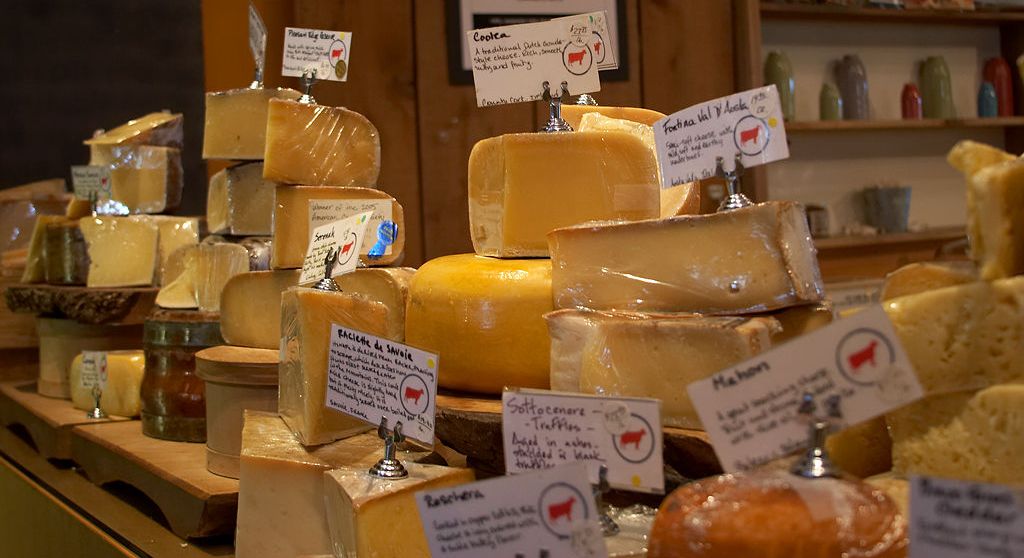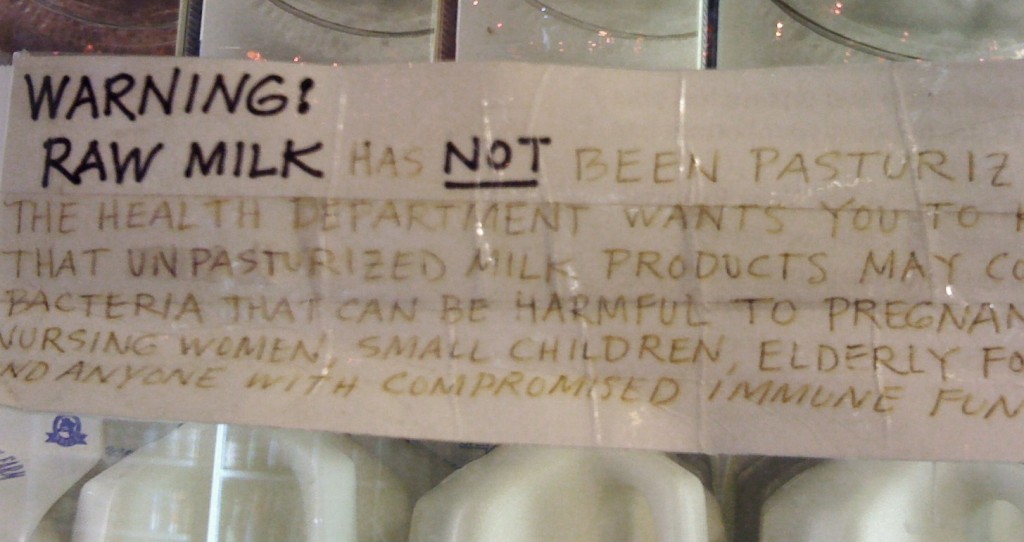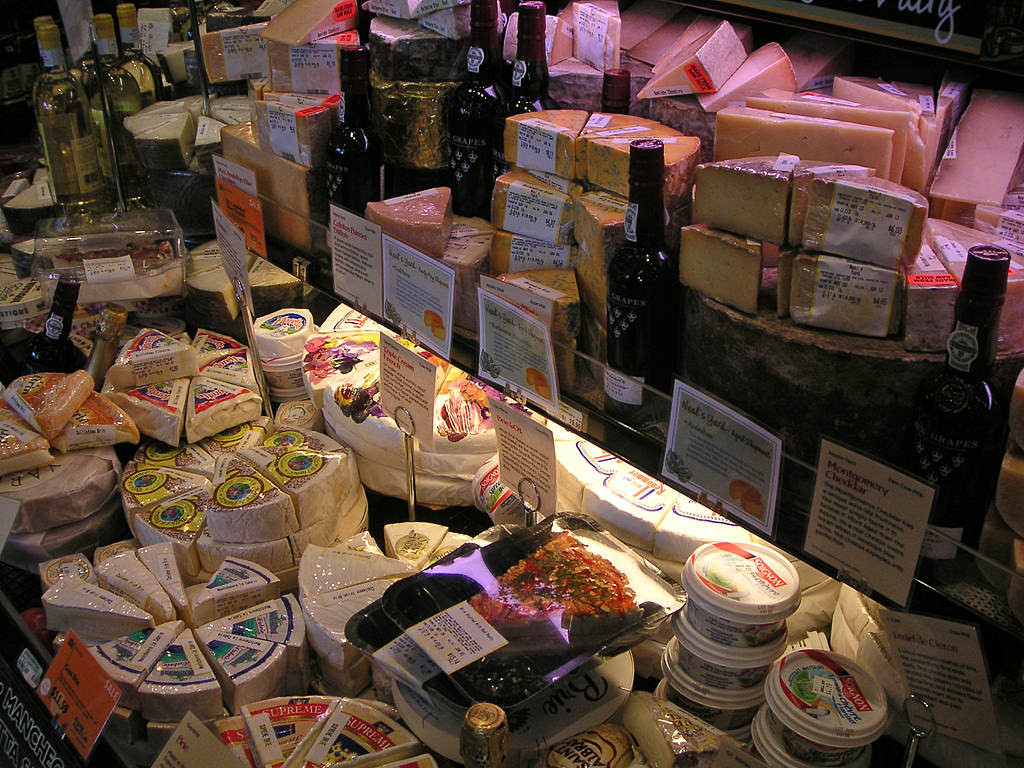Artisan Cheese : Why You Should Care About Raw Milk
Kelli Estrella is a cheese rock star. Her small company, Estrella Family Creamery located off the grid in tiny Montesano, WA has garnered numerous national and even international awards since its inception ten years ago. The Estrella Creamery is not alone; other northwest artisan creameries including Beecher’s (Seattle), Quillisascut Farm (Rice, WA) and Rogue Creamery (OR) also produce remarkable artisan cheeses, and they too have the awards that prove it. Cheeses made by these and other artisan creameries across the country are described as European style cheese because they are formulated and aged the way European cheeses have for centuries.
Artisan cheese appeared commercially in the U.S. about thirty-five years ago. In that short time some have received international attention and accolades among the world’s finest cheesemakers.
Cheeses from Washington, Idaho, New York, Oregon, California, Vermont and Wisconsin now appear on fine restaurant menus alongside their established European counterparts. Artisan cheeses are sold in specialty food stores, and most are available at local farmers markets. More than ever before Americans are eating and appreciating fine artisan cheese made in our country.
There is a problem though. Some of these great cheeses are made with raw milk, and the FDA is determined to eliminate raw milk cheese from the marketplace. A recent FDA press release states: “Raw milk is inherently dangerous and it should not be consumed by anyone at any time for any purpose.” (Seems pretty clear.) FDA concerns center on the argument that raw milk products (as opposed to pasteurized products) may harbor food-borne bacteria that can cause illness.
While technically this is true, the data supporting the argument – the actual cases of illnesses from raw milk products – do not appear to justify an all-out ban. The FDA’s efforts have stirred up a lot of discussion, argument and legal drama in the press and in the food community, and several artisan cheesemakers have had to close their creameries. More are in danger of closing and are suffering income losses.
I first learned about the problem last year when I read a newspaper article about a raid and subsequent stop-work order at Estrella Creamery. A “raid” at that tiny family creamery! Horrified, I decided to do some research, hoping I could help – through this article – to raise awareness of the issue and ultimately, to prevent the disappearance of fine raw milk cheese in our country. The issues I see are presented here along with some suggestions for how we can all help.
First a little background:
An Abridged History of Modern Cheese In America, From Velveeta to Artisan
Kraft Foods opened its first cheese “factory” (their word) in 1914. The company concentrated its effort to produce mass-market cheese that all Americans could enjoy. Ten years later Kraft succeeded in the effort and introduced Velveeta to the marketplace. A complete departure from traditional cheese, this inexpensive, smooth- textured, pastel orange processed food set a new visual and taste standard for cheese in America. For the next fifty years orange cheese, preferably “mild” was a diet staple in American households. There was even an “American” cheese style – Kraft Singles. Kraft cheeses symbolized good nutrition (“a glass of milk in every slice!”) and, as they were ultra-pasteurized and processed (Velveeta doesn’t need to be refrigerated until it is opened.) they also were extremely safe foods.
By the mid-1960’s, with Julia Child leading the charge, imported foods became more commonplace and America’s tastes for European cheeses matured. Cheese sections appeared in supermarkets, although varieties tended to be limited in sophistication to aged cheddar and processed Swiss.
By the 1970’s, cheese boutiques appeared, selling cheese from all over the world including France, Italy, Spain, Greece, England, Ireland, Mexico, South America and New Zealand. At the same time a few small artisan cheese creameries cropped up around the U.S. introducing European-style cheeses made on family farms from the milk of their cows, sheep and goats. Still in very small quantities, these cheeses were sold at farm stores, to individual restaurants and at farmers markets.
By 2000, American artisan cheeses were winning respected national (American Cheese Society) and prestigious international (World Cheese Awards) competitions.
Today, of course, in most supermarkets customers can choose from a wide variety of cheeses, some imported and some from artisan creameries. Our cheese palates have become sophisticated.
Pasteurized or Raw – What’s the Difference?
Cheese is made from either pasteurized or raw milk; both methods can produce spectacular cheese. A few artisan creameries like Beecher’s and Rogue Creamery make both pasteurized and raw milk cheeses.
Because pasteurizing kills all living bacteria in milk, flavor is added to create interesting and sometimes extraordinary tastes that develop while the cheese ages. Raw milk cheese is not cooked at high temperature; the unique taste and texture complexity inherent in the milk remains. Those two qualities cannot be duplicated after pasteurizing. Raw milk cheese often has flavors added as well, but each batch still has its own unique character. Europeans have made raw milk cheese for centuries.
In Comes the FDA – Who Invited Them?
As hard as American artisan cheesemakers have worked to hone their craft, and as much as the American consumer has appeared to enjoy (and be willing to pay a higher price for) raw milk cheese, the industry still is quite small. There are fewer than 100 farm-based dairies across the country that sell artisan cheese made with raw milk. Most sell shares in their farms to individuals who are the dairies’ only customers. A few of the dairies sell only at their farm sites; the rest sell also at local farmers markets, small grocery stores, to restaurants, specialty food stores and on the Internet.
One reason the industry hasn’t thrived is because of FDA intervention. Relying on FDA recommendations for a complete ban on raw milk, 26 states have completely barred the sale of raw milk and raw milk products. Nearly half of the raw milk dairies left in the remaining 24 states where it’s still legal, only sell fresh ricotta or cottage cheese, not European style aged cheeses. Needless to say, the FDA’s intervention to stymie the raw milk industry has worked.
What is the FDA’s specific gripe with raw milk? Bacteria, specifically three that can develop in raw milk and milk products: Salmonella, E coli and Listeria. All three certainly can be harmful. Salmonella can cause vomiting, abdominal cramps and diarrhea. E coli can cause severe illness and even death, particularly in small children. Listeria can endanger pregnancies and result in prolonged illness in children, the elderly and people with compromised immune systems. Once established in raw milk cheese any of these bacteria it can grow as the cheese ages. Tests developed to find and isolate the bacteria in raw milk cheese are reliable and available.
Scary? Not really. These bacteria have been found in raw milk cheeses only very rarely. In the 10 years between 1998-2008, for example, there were only 1,614 reported illnesses associated with raw milk in the U.S. Moreover, the FDA itself states that the vast majority of these illnesses (and a mere 2 deaths within that number) were the result of eating Queso Fresco, a Mexican style fresh cheese that was made in unlicensed kitchens. Several brands of pasteurized Queso Fresco made by licensed dairies and creameries are sold in major supermarkets. None of them was involved in or associated with the report.
There has never been a reported death in the U.S. that was associated with eating a European style, artisan raw milk cheese.
Nevertheless, the FDA – as the protector of public health – has continued to focus attention on raw milk and raw milk products including raw milk cheese, as a public-health threat. In 1987 the FDA required that all milk “packaged for human consumption” had to be pasteurized before being shipped from one state to another. It also requires that all raw-milk cheese must be aged for a minimum of 60 days before it can be sold.
But that was 1987. You’d think, or at least hope that as the raw milk artisan cheese industry gained world-wide respect and popularity, that the FDA might figure out a way to balance the interests of the industry with the interests/safety of the consumer. Instead it increased its complete-ban pressure. Arguing that its own estimate of only 1,614 illnesses over a 10-year period probably was low due to underreporting, and ignoring the unlicensed Queso Fresco variable, the FDA cautioned as recently as March 26, 2010:
“Protect Your Family with Wise Food Choices…Taking a few moments to make sure milk is pasteurized – or that a product isn’t made from raw milk – can protect you or your loved ones from serious illness…Don’t buy milk or milk products at farm stands or farmers’ markets unless you can confirm that it has been pasteurized.”
Let Them Eat Cheese – The European Approach
Europeans, not surprisingly, are much more laissez-faire about the issue. They have produced and eaten raw milk cheeses for hundreds of years. Many of their cheeses, including raw milk cheeses are nothing short of revered. The European approach appears to be to regulate commercial production reasonably, and not ban raw milk products all together. Surely some Europeans have become ill from time to time, and unquestionably some of the smaller European governments do not compile public-health records with the same vigor that we do, so yes, their statistics may not be accurate. Still, their approach seems logical. Recognizing that small artisan creameries don’t want to make people ill any more than people want to be ill, the Europeans allow the creameries to function and help them produce safe products. It’s better for the small creameries and better for the consumer.
Where Do We Go From Here? How Can We Help?
Several questions arise from this quagmire; some can be answered and some remain mysteries. One obvious question is whether, in fact it is possible in a farm environment to make raw milk cheese in European styles and still adhere to the FDA zero tolerance policy for Listeria, Salmonella and E coli.
The answer is yes and no. All artisan creameries licensed to sell their products operate under strict, comprehensive health safety regulations that include constant testing for temperature controls, cleanliness and bacteria. The artisan cheesemakers with whom I spoke said compliance with zero tolerance for Listeria is important and possible, but it also is very expensive, as it requires hiring outside testing laboratories on a continuous basis and, in the case of older farms with creameries, restructuring and/or rebuilding their buildings and aging caves to zero-tolerance conditions. As most artisan creameries are very small, family-owned businesses located on their family farms, the expense involved in complying with zero tolerance is prohibitive.
Other naturally arising questions don’t lend themselves to equivocal answers, as there simply does not appear to be information available with which to examine them.
These include:
- Why is the FDA spending so much time and money on this issue?
- From where has the financial support come to legislate all-out bans in 26 states?
- Why have large food retailers, celebrity chefs and the American Dairy Association been so silent about this issue?
I am not one who sees conspiracies behind every news report, but it is difficult not to wonder whether Kraft or other large producers haven’t had something to do with this issue.
We may never know, but perhaps we can, indeed, do something to help. Those of us lucky enough to live in states where artisan raw milk creameries still legally operate can continue to patronize them wherever they are selling their products. If pressure mounts for a ban in our state, we can speak up to our local legislators in support of the industry.
- We can talk with the dairy managers at our local supermarkets, telling them how much we would love to see raw milk products more readily available.
- We can write to our Congressional delegates, urging them to work with the FDA to reconsider their stance or at the very least, to assist raw milk creameries in their efforts to meet the zero-tolerance policy, rather than driving them out of business or simply allowing them to die.
- Using the Internet we can encourage our acquaintances from all over the country to join us in our efforts.
We can do all of these things. And maybe it will help. Although admittedly I am a “foodie,” I, for one think that these extraordinary cheeses enrich our culinary environment. I also am a strong believer in the importance of small, local businesses. Artisan creameries like Estrella, Qullisascut, Rogue, Beecher’s and others are “First In Class” in this category. We should fight hard to keep it that way.



Good article on cheese. I can’t stand this “cheddar” they sell for $2/# in WA.
Hi Heidi
Great article and I am all for “locavore” and bygones. I do want to add that we actually know someone in Seattle whose sister was traveling in France in the mid 80’s. She was pregnant and evidently ate some raw milk cheese. 8 months later she gave birth to a child with severe abnormalities. I have since
thought it is important for pregnant women to know about raw cheese and things like kitty litter.
Thanks for the good coverage on the history of such craziness and let’s hope the Estrella Family gets through this successfully.
Anne
Heidi, your piece on cheese is clear and informative and, as with all your writing, wonderfully lively. Thanks for taking up the issue, and for getting the word out to those of us not so close to the battle.
John
Hi Heidi
Thanks a lot for your comprehensive look at the cheese industry….how can one live without Beechers!? Great article…hope all is well with you wherever you may be!
Louise
Should it not be our decision to be able to choose to buy the fabulous artisan cheeses you listed
rather than colored Kraft rubber slices? It breaks my heart that our government chooses to pounce on the little people.
Thanks for adding your insight to this important conversation! I am concerned that your statement, ‘Relying on FDA recommendations for a complete ban on raw milk, 26 states have completely barred the sale of raw milk and raw milk products.’ implies that raw milk cheese (milk products) is barred in 26 states which I don’t believe to be true, is it so?
Thank you for your comment. Watch for revised FDA regulations that are being considered now. Wholesale ban of commercial sales raw milk and raw milk products seems to be in the offing. A tragic farce.
Heidi
Thank you for your comment, Lia.
Tom, Thank you for commenting on the posting. Multiple sources I accessed while researching the raw milk/cheese issue stated that information. It is pretty shocking.
Heidi
Heidi, as a “foodie” I can not imagine doing away with the flavors of raw milk. My cousin, Petrina and her husband have award winning cheeses from their farm near Fransehhoek in the cape area of South Africa. Dalewood Fromage. They can’t believe what we American’s do to our food industry. Our fear is killing us. Perhaps letters to those who make the laws. Any recommendations as to the heavy hitters? What would your letter say? Kristin
Tom,
Thank you for helping us shed some light on this complex situation. As you alluded, it is still legal now for cheese made from unpasteurized milk to be shipped interstate if it has been aged over 60 days. To my mind the combination of FDA regulations and state regulations makes it difficult to speak in generalities about raw milk! Please let me know if my understanding is not correct.
Sincerely,
Stephanie
Heidi,
Thanks for the cheese/dairy education. Your article seems well balanced and reasonable. Usually it is “follow the money” be it Kraft or whomever. Best line is …Recognizing that small artisan creameries don’t want to make people ill any more than people want to be ill. Let’s continue to have freedom of choice in this country!
Carry on,
Jean Amick
great article, Heidi!